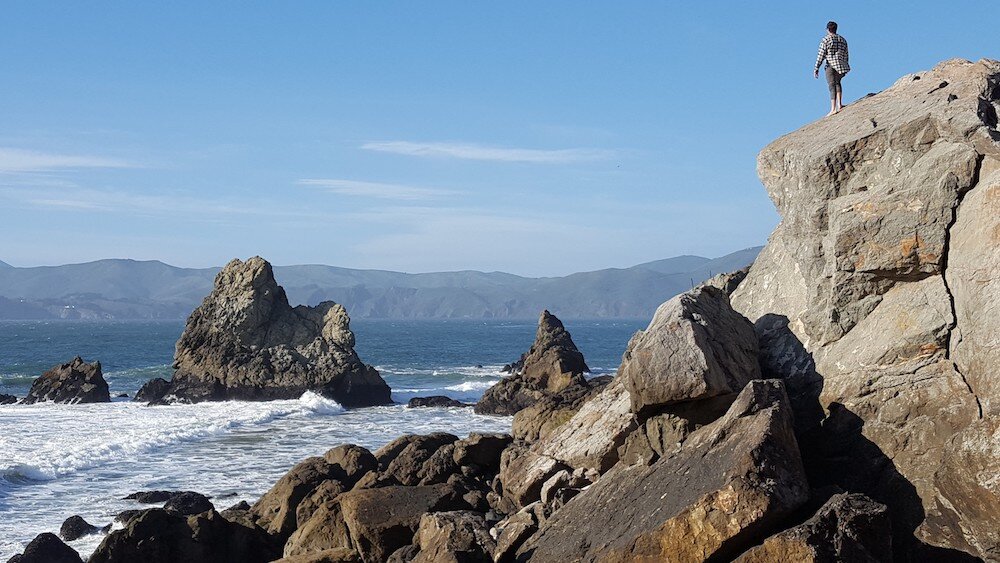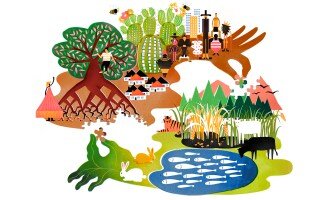
Is there nothing you can do about the environment?
Nothing may be one of the best things you can do.
One day every week. Do nothing.
Take a weekly day of rest. Make it a real sabbath. For you. For earth.
Don’t drive. Don’t shop. Don’t build.
Take a walk. Eat with friends. Play or read with your kids. Sing. Meditate. Celebrate contentment.
Taking a break
Increasing numbers of people see the wisdom of observing a weekly day of rest, of minimizing one’s environmental impact. For many, this has nothing to do with God or religion; it is merely common-sense self-care for oneself and our planetary home. Yet the inspiration of the ancient biblical sabbath stands clearly behind these practices. Filmmaker Tiffany Shlain came up with a technology shabbat for her family, a break from all devices with screens. Every Sunday since 2007 Mexico City has handed over some 55 km of streets around the historic city center to bicyclists, skateboarders, rollerbladers, toddlers on push toys, parents behind strollers, and other pedestrians, attracting sometimes tens of thousands of people. More recently, Bogotá, Colombia, has introduced car-free Sundays that the population savors, while England’s Playing Out has helped parents in hundreds of places temporarily close off local neighborhood streets to car traffic so that kids can play. In 2024, Philadelphia closed off many streets in the central shopping and dining district of West Walnut on the Sundays of September. When Israeli cities shut down for the Jewish holiday of Yom Kippur (the Day of Atonement), nitrogen oxide pollution in the air decreases for the day by 70-99% .
Many cultures have instituted ritualized days of rest. The Igbo, who currently live mostly in Nigeria, have a four-day week. They consider the second day, Orie, to be a holy day of obligation, on which farmers rest from farming and feast with their family. Among some Fante fishing communities on Ghana’s coastline there are sacred days, usually Tuesday, set aside as a rest day for fishermen. No fishing is allowed on those days. This gives the sea the time to replenish its fish stock. Similarly, among the people of Dormaa Traditional Area in the Brong Ahafo Region of Ghana it is prohibited to work the land or go into the bush/forest for any occupational activity on Tuesday. As a respite from the tremendous pressures of his political activism, Mohandas Gandhi took each Monday as a day of total silence. His inspiration was the practice of many Hindus to fast on a particular day of the week -- each day is dedicated to a different god. A typical Vrata (day of fasting and/or religious rituals) involves a fast for a fixed period of time, usually from sunrise to sunset, where either no food is eaten or only one meal is eaten, or only a certain food such as milk is consumed. Silence is usually maintained. Other practices include sleeping on the ground or for only a short time, or yoga with meditation, reading Hindu scriptures and charitable giving. Since the Buddha’s time, many Buddhists have observed uposatha days, often on a weekly basis in conjunction with the phases of the moon. Uposatha days were intended by the Buddha for cleansing the mind. On these days practitioners intensify their practice, observe certain forms of abstinence, deepen their knowledge and express communal commitment through acts of reciprocity.
Try it. One day a week, minimize the need for more goods, minimize the use of natural resources, minimize the emission of carbon dioxide and other pollutants.
The Sabbath is said to be a foretaste of the world to come (Babylonian Talmud, Berakhot 57b). Literally. If you care about our future, about your well-being, observe a real sabbath day of rest. It helps cultivate community, self-discipline, inner calm and contentment. One powerful weapon in the fight against environmental deterioration and climate disaster may just be an age-old spiritual technology.
It could be merely a question of doing nothing.

“I used to think that the top global environmental problems were biodiversity loss, ecosystem collapse, and climate change. I thought that with thirty years of good science we could address these problems. I was wrong. The top environmental problems are selfishness, greed, and apathy, and to deal with these we need a spiritual and cultural transformation.”
— James Gustave Speth, co-founder, Natural Resources Defense Council; Chairman, Council on Environmental Quality for President Jimmy Carter; founder, World Resources Institute; Administrator, U. N. Development Programme
Latest Contributions
What can you do?
What do we want from you? Mostly nothing. Mostly willpower. Try to “do nothing” one day a week. Try to observe a real sabbath day of rest. Promote the idea and its practice. There are no rules, no measuring, no grades. Do the best you can. This is an effort based purely on good will. Can we collectively reduce our harm to the environment through sheer willpower? See the calls to action written by our founder and director, Jonathan Schorsch, “The Sabbath in an Era of Climate Change” or “Green Spiritual Technologies: Putting the Anthropocene Era to Rest (One Day a Week).”
Clergy (of all religions and denominations)
Join our growing list of clergy who have pledged to observe and promote green sabbaths.
Leaders (environmental, political, business, etc.)
Join our growing list of leaders who have made the green sabbath pledge.
Advertisers and Graphic Designers
Submit ads promoting the idea of a green sabbath. We will post them on our website and make them available free for use by anyone.
People Who Organize (Green) Sabbath Events
Send announcement-invitations to us so that we can post them on our global calendar and help make others aware of ongoing environmentally-friendly sabbath activities. Please send in descriptions of events, activities or rituals that you have organized or experienced that have moved you or been particularly fun.

Join Our Mailing List
Sign up to be the first to know about our news and events.










